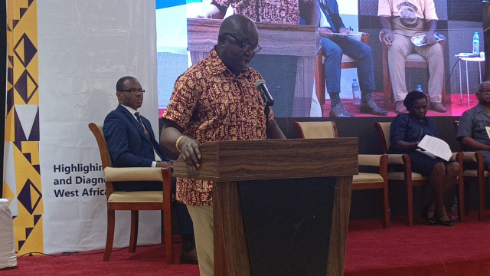
Opening Remarks
10th Anniversary celebration of CelebrateLab 2025
on Behalf of the Liberia Medicines & Health Products Regulatory Authority (LMHRA)
By: Luke L. Bawo
Sponsor: Africabio Enterprises, Inc.
Ladies and Gentlemen, Distinguished Guests, Esteemed Speakers, and Participants,
It is both an honor and a privilege to address such a distinguished group of professionals, researchers, and innovators dedicated to the critical field of laboratory science. It is a pleasure to see so many here today, united by the shared commitment to excellence, innovation, and collaboration in laboratory practices.
As we commence this 10th Anniversary celebration of CelebrateLab 2025 with its theme “Propelling our Professionals into the FUTURE of NOW!”, we are mindful that this conference is not just about discussions and presentations; we are setting the stage for transformative ideas and partnerships that have the potential to shape the future of laboratory science. We want to position our laboratories to be at the forefront of scientific discovery, providing the critical data and insights that drive advancements in healthcare, public safety, and environmental sustainability.
We at the Liberia Medicines and Health Products Regulatory Authority understand and appreciate the value added in having a responsive laboratory system. Laboratories play a vital role in supporting drug regulatory authorities (DRAs) by ensuring the safety, efficacy, and quality of pharmaceuticals throughout their lifecycle. Here are several key ways in which laboratories can assist DRAs:
- Conducting Rigorous Testing
Quality Control: Laboratories perform extensive testing on raw materials, intermediate products, and final drug formulations to ensure they meet specified quality standards. This data is crucial for DRAs when assessing product quality.
Stability Testing: By conducting stability studies, laboratories provide critical information about the shelf life and proper storage conditions for drugs, which DRAs require for approval.
- Generating Robust Data
Clinical Trials: Laboratories involved in clinical research generate comprehensive data on the safety and efficacy of new drugs during clinical trials. This data is submitted to DRAs for evaluation and approval.
Assay Development: Developing and validating analytical methods allows laboratories to produce reliable and reproducible data that supports regulatory submissions.
- Compliance with Regulatory Standards
Good Laboratory Practices (GLP): Adhering to GLP ensures that laboratories operate in compliance with established standards. This compliance builds trust and provides the requisite documentation that DRAs rely on.
Documentation and Reporting: Maintaining thorough records and accurate reports of laboratory tests helps DRAs verify that all regulatory requirements are met.
- Post-Market Surveillance
Monitoring Adverse Effects: Laboratories can participate in pharmacovigilance by monitoring and reporting adverse effects and other safety concerns once drugs are on the market, thus aiding DRAs in improving post-market surveillance.
- Public Health Studies:
Laboratories can partner with DRAs on research initiatives that address public health concerns, providing valuable data for assessing drug efficacy and safety in real-world scenarios.
There are many more areas that laboratories could be of support to Drugs Regulatory Authorities including Batch Testing, Capacity Building, Skill Development, etcetera and etcetera.
The LMHRA is concluding negotiation for a Private-Public Partnership (PPP) agreement for the modernization of its Quality Control Laboratory in Careysburg. Additionally, the authority is contemplating deploying technologies for the tracking of health commodities as well as for managing routine processes.
We look forward to an engaging and productive symposium that will not only broaden our perspectives but also forge stronger connections within the laboratory community.
Let's ensure that we keep our focus on innovation, collaboration, and the unwavering commitment to safety and efficacy in everything we do.
I Thank you.